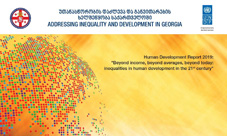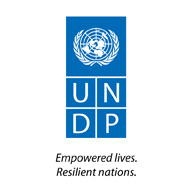
Addressing inequality: debate on Georgia’s development prospects
By Nika Gamtsemlidze
Wednesday, January 22
The United Nations Development Programme (UNDP) and Administration of the Government (AoG) organized a discussion in Tbilisi on January 21.
The main conclusion of the discussion was that inequality poses obstacles to human development in Georgia, as it does worldwide, but aligning policies with the Sustainable Development Goals (SDGs) can help ensure that economic growth ‘leaves no one behind.’
The event was opened by Natia Turnava, Minister of Economy and Sustainable Development, and Louisa Vinton, Head of UNDP in Georgia.
The forum hosted a discussion of the latest edition of the UNDP Human Development Index, which places Georgia at 70 of 189 countries around the world, ahead of Armenia at 81, Azerbaijan at 87 and Ukraine at 88, but behind Russia at 49, Belarus at 50 and Turkey at 59.
UNDP Chief Regional Economist Ben Slay explained that this ranking qualifies Georgia as a country of high human development, but that the country loses 12 percent of its progress when inequality is factored into the equation.
According to UNDP Head Louisa Vinton, it’s common sense that human welfare depends on more than just money.
“Our approach goes beyond income to look at other factors like health, education, and opportunity. And here we see how crucial a principle it is to commit to leaving no one behind,” noted Vinton.
The Head of the Prime Minister's Office, Giorgi Sakhokia noted that addressing these challenges is the very priority for the Government of Georgia. It’s a core of the programme and the authorities are actively working in this direction.
As he said, recognizing that many challenges remain “Georgia is committed to refining our policies to ensure that every citizen enjoys equal opportunities and a fair share in the fruits of prosperity.”
Georgia’s progress towards the SDGs was a second topic. A joint UN-AoG exercise concluded that 93 percent of SDG targets are reflected in national strategies, with the EU Association Agreement alone accounting for 63 percent.
To accelerate progress towards the SDGs, the exercise recommended focusing on four priority areas that are 'bottlenecks' for development: Reducing disparities between rural and urban areas, creating decent employment opportunities for youth, overcoming gender gaps and other inequalities, and developing green energy.
The forum concluded with a discussion involving representatives from ministries with crucial development responsibilities on concrete efforts to fight inequality and realize the SDGs in Georgia.


